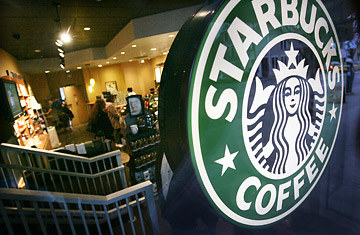
Coming soon to your corner Starbucks: More coffee-ness.
Starbucks loyalists have asked for change. And CEO Howard Schultz is ponying up.
At its annual meeting today, Starbucks announced five new initiatives that are meant to steer the Seattle-based chain back to its roots — and presumably back in the arms of the caffeine-hunting populace.
The new plans come after two rough quarters for Starbucks, which saw traffic and comparable-stores sales in its U.S. business fall for the first time ever. The slip is partly due to softening consumer spending, but Starbucks executives insist that by retraining the company on a coffee-centric customer experience, they can revive sales and the brand. "This is in many ways self-induced," says Schultz. "That's why I feel so confident and optimistic we can fix it ourselves."
One of the broadest changes is a loyalty-rewards program starting in mid-April for anyone who buys a Starbucks card and registers it online. Participants will get free refills on drip coffee, a free cup of coffee when they buy a bag of whole bean coffee, two free hours of Wi-Fi a day and free upgrades — including syrups, soy milk, and extra whipped cream — on all lattes.
A new blend, Pike Place Roast, will be ground fresh in stores for drip coffee — a practice that was all but eliminated years ago in order to save baristas time behind the counter.
Starbucks plans to roll out a new espresso machine, the Mastrena, which is half a foot shorter than the current Verismo model and will let customers more easily see baristas making drinks. The new machine also gives baristas more freedom to pull different sorts of shots — such as a ristretto (which takes less water) and a long shot (which takes more) — and to more closely control the process of steaming milk.
The company will also introduce a web site for customers and another for employees to share thoughts with the people who run Starbucks. MyStarbucksIdea.com will initially include about a dozen categories, such as coffee, atmosphere, food, music and social responsibility. People will be able to post, discuss and vote for ideas, such as having a separate line for customers who want to quickly order drip coffee. Forty-eight Starbucks employees will respond to the posts and take suggestions back to management. "Their job is to show up every day and engage with customers about their ideas," says chief technology officer Chris Bruzzo.
Finally, the company will launch a relationship with Conservation International to address the issue of deforestation around the world — a problem that affects the farmers that Starbucks buys its beans from since coffee is traditionally grown in the shade. As part of the partnership, Conservational International will start certifying the way Starbucks sources its coffee, expanding the company's own ethical and ecological guidelines.
The changes are in response to the impression, from both inside and outside the company, that over the past few years Starbucks has strayed from its roots as it has jumped into endeavors as diverse as producing CDs, promoting movies, selling teddy bears and warming up breakfast sandwiches.
In early January, Schultz (who took over Starbucks in 1987 when it was a six-shop coffee bean retailer), resumed the title of CEO, a position he originally left in 2000 for a seat on the board of directors. Since then, the company has announced a number of major changes. On January 30, the company said it would stop selling breakfast sandwiches (in response to criticism that the odor covered up the smell of coffee), slow its rapid pace of opening stores in the U.S., and no longer report comparable-store sales to Wall Street — a sign that the company is serious about investing for long-term growth and not catering to short-term concerns from investors.
The five initiatives the company announced at its annual meeting will start in the U.S. Overseas sales have held up well in recent quarters despite the slackening in the U.S. business.
Taken together, the changes are meant to underscore Starbucks' leadership in the realm of coffee. This is, after all, the company that taught us what a latte is and that it should cost $4. That goal of owning the coffee space is even more relevant today as competitors such as McDonald's, Burger King and Dunkin Donuts upgrade their drip coffee and roll out espresso-based drinks.
Unlike many sellers of coffee, Starbucks sources its own beans from Latin American, Africa and the Asian-Pacific rim, and then roasts them in its own plants. "We go out to the farms. We are roasters. We control the entire process, and other players don't," says global strategy head Michelle Gass. "Coffee is our business, and we need to get back on our toes."
